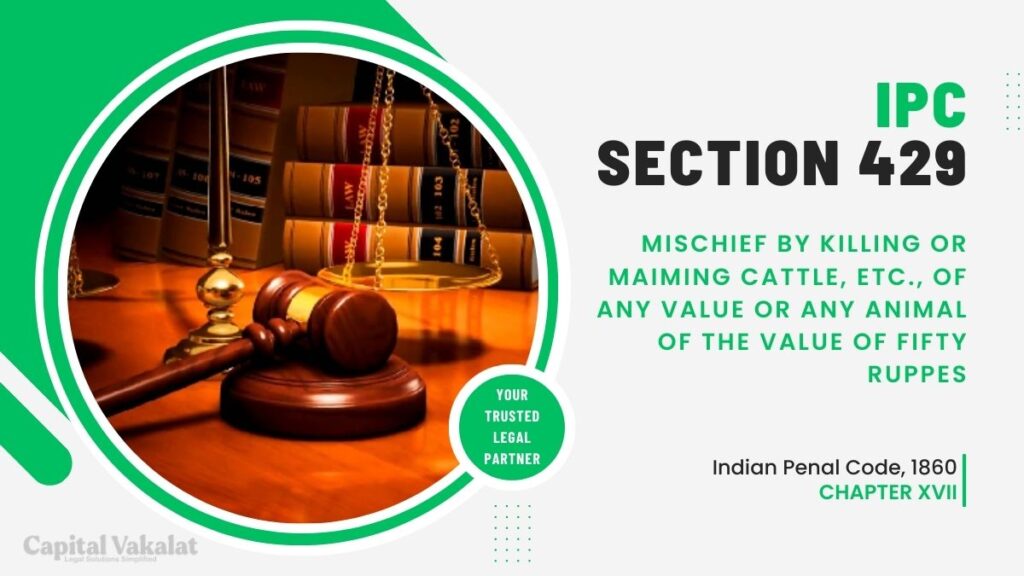Section 429 of the Indian Penal Code (IPC) addresses the grave offense of mischief by killing or maiming cattle or any animal with a value of fifty rupees or more.

This provision plays a crucial role in safeguarding the interests of animals and preventing cruelty towards them.
Understanding Mischief in Legal Terms
In the legal context, “mischief” refers to willful conduct causing damage, injury, or harm to the property or rights of others. When examining Section 429 IPC, the legal interpretation of mischief gains specific nuances, particularly concerning the well-being of animals.
Scope of Section 429 IPC
The scope of Section 429 IPC extends beyond conventional ideas of cattle. The provision encompasses not only cattle but also any animal with a value of fifty rupees or more. This broadens the protective umbrella, ensuring a comprehensive approach to prevent harm to animals, irrespective of their category.
Historical Context
To comprehend the significance of Section 429 IPC, it is essential to delve into its historical roots. The provision has evolved over time, shaped by amendments and landmark cases. Understanding this evolution provides insights into the legal framework governing offenses against animals.
Penalties and Punishments
The severity of penalties prescribed under Section 429 IPC underscores the gravity of the offense. Offenders can face imprisonment and fines, serving as a deterrent against acts of cruelty towards animals. A comparative analysis with related legal provisions sheds light on the distinctive punitive measures in place.
Case Studies
Real-life cases prosecuted under Section 429 IPC offer a glimpse into the tangible impact of the provision. Examining these cases provides an understanding of the societal and individual consequences of offenses against animals, emphasizing the need for strict enforcement.
Controversies and Debates
While Section 429 IPC serves a vital purpose, it is not immune to controversies and debates. Criticisms regarding its efficacy and calls for amendments highlight ongoing discussions within the legal and advocacy communities. Exploring these debates fosters a comprehensive understanding of the provision’s strengths and weaknesses.
Role of Animal Welfare Organizations
Collaborations between law enforcement agencies and animal welfare organizations are pivotal in ensuring the effective implementation of Section 429 IPC. Initiatives aimed at raising awareness about the provision and promoting responsible animal treatment contribute to a more compassionate society.
International Perspectives
A comparative examination of similar laws globally provides context to Section 429 IPC. Understanding how other jurisdictions address offenses against animals offers insights into potential improvements or adjustments that can enhance the effectiveness of the Indian legal framework.
Conclusion
In conclusion, Section 429 IPC stands as a bulwark against cruelty towards animals, reflecting society’s commitment to their welfare. The provision’s historical evolution, penalties, case studies, controversies, and international perspectives collectively contribute to its significance. Public awareness and responsible animal treatment are crucial in upholding the spirit of Section 429 IPC.
Frequently Asked Questions
What penalties can offenders face under Section 429 IPC?
Offenders can face imprisonment and fines, the severity of which is determined by the specifics of the offense.
How have amendments shaped the evolution of Section 429 IPC?
Amendments have played a crucial role in refining the provisions and adapting them to the changing landscape of animal welfare laws.
What role do animal welfare organizations play in enforcing Section 429 IPC?
Animal welfare organizations collaborate with law enforcement to ensure effective implementation and raise awareness about the provision.
Are there global efforts to combat crimes against animals similar to Section 429 IPC?
Yes, many countries have laws and initiatives aimed at preventing cruelty to animals, reflecting a global commitment to animal welfare.